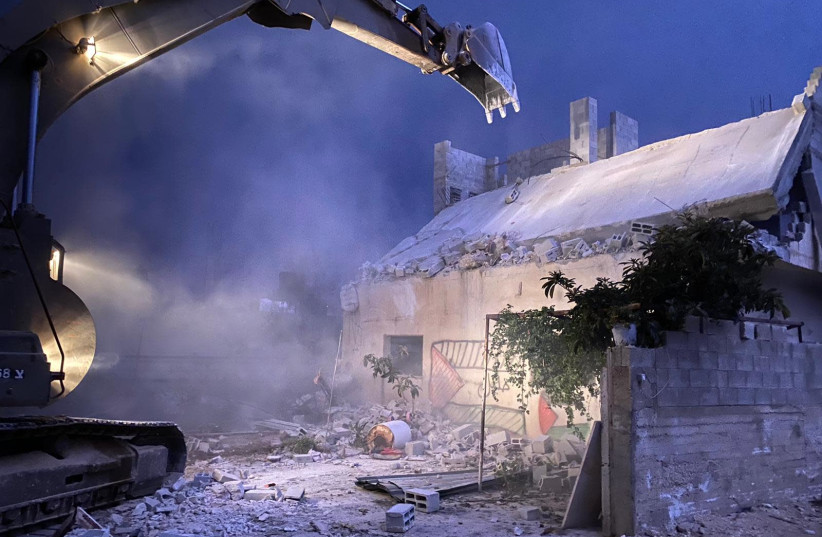In February 2005, during the government of then-prime minister Ariel Sharon, then-defense minister Shaul Mofaz and IDF chief Moshe Ya’alon ordered a moratorium of punitive house demolitions against the families of Palestinian terrorists.
A commission of top defense experts led by Maj.-Gen. (res.) Udi Shani had empirically studied whether house demolitions over the last few years of the Second Intifada had increased deterrence against terrorists, concluding that the opposite was true.
Yet in 2023, it seems that nearly the entire defense establishment is convinced that house demolitions do deter future potential terror attacks.
They are so sure that they even want to seal off the house of the family of the 13-year-old Palestinian who shot but did not kill, two Israeli victims – which would be the first time that such a measure would be taken against an attempted murderer versus an actual murderer.
What, if anything, changed between 2005 and 2023 about Israel, the Palestinians, house demolitions and deterrence?
The 2005 committee found that house demolitions, rather than deterring future terrorism, generally inflamed hatred and increased motivation for future attacks by Palestinians against Israel.

According to the defense commission, there had only been 20 cases in which the threat of demolition deterred potential attackers or pushed their families to turn them in – out of hundreds of demolitions since 2001.
Fundamentally, the commission report simply pointed out that after hundreds of demolitions, the Second Intifada had not been put down.
Furthermore, the report said that in many cases house demolitions hit families which, other than the one terrorist attacker, were not part of a greater terror group and were viewed by the greater Palestinian public as illegitimate collective punishment.
This meant that sometimes new terrorists were even being created from families or neighbors of these families who might not have become a problem.
Another part of the problem, the committee said, was that different Palestinian groups, whether the Palestinian Authority, Hamas or otherwise, frequently compensated families of terrorists and helped them rebuild new homes, weakening possible deterrence.
In addition, if there had been some short period earlier in the Second Intifada when a small number of demolitions might have had a deterrent effect, as the policy went on longer, the deterrent effect was lost.
With some very limited exceptions, Israel stopped demolishing Palestinian houses for punitive deterrent purposes from 2005-2014 – almost a decade.
It was after Palestinian terrorists murdered three Jewish teenagers that the then-government of Benjamin Netanyahu (who went almost five years without demolitions) reinstated the demolitions policy.
The issue was probed again by the Shin Bet (Israel Security Agency) during the 2015-2016 Knife Intifada, but this time the overwhelming majority of officials found that the demolitions were having a deterrent effect.
Significant numbers of Palestinians who started toward an attack, but relented, or parents who turned in their kids before they could commit an attack in process, said that saving the family house had impacted them greatly.
Some officials did a victory lap on the issue in 2016 as one of the reasons – along with new technologies and analysis of social media – that the Knife Intifada was put down before it blew up into a “full Intifada.”
The Jerusalem Post recently received additional confirmations from defense officials dealing with some of the greatest Palestinian violence in the northern West Bank which concluded that demolitions are still providing deterrence.
They repeated the same updated 2022 testimonies of Palestinians (not just relying on the 2015-2016 data) who pulled back from terror at the last minute or turned in their kids to stop them from terror.
One fascinating point was that some of these officials did not even know that Israel’s moratorium on house demolitions had gone on for so long, nearly a decade. In fact, they were quite shocked by the notion.
Part of what is interesting about that is that the years 2005-2014 – without house demolitions – were a much less violent time period than 2015-2023 has been with house demolitions.
Of course, one counterresponse to this argument is that this was because the IDF hit Palestinian terror much harder and deeper during the Second Intifada, and it was this that provided quiet.
Some also say that if the IDF did house demolitions faster, not with weeks or months of delay, then there would be greater deterrence. Maybe, but there is no guarantee there either, and there have been cases where a terrorist’s family had nothing to do with their activities and rushing forward without figuring that out would have broken even Israeli law as it currently exists (keeping in mind that though international law has a place for house demolitions, Israel is an outlier among democracies in actually performing them).
Some other questions worth asking
But it is worth asking; when Israeli defense officials in 2023 say they are sure that demolitions provide deterrence, are they fully and seriously considering the opposing view?
If some of them do not even recall a world without house demolitions, can they be said to fully consider that view?
And if Israel has been doing them more aggressively than ever since March 2022 without ending the current waves of violence, what does that say?
There are no easy answers to these questions. But they are questions that could be crucial to ask by security professionals who seriously consider both sides and who ignore partisan noises for and against the demolitions on either political side of the spectrum.
